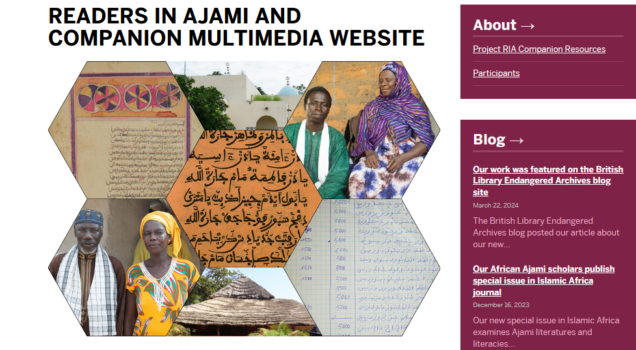Our “Readers in Ajami” project featured at the International Research and Studies Program meeting
Our staff members attended the Project Directors Meeting of the International Research and Studies Program of the United States Department of Education that took place on April 12, 2024, in Washington, DC. Prof. Fallou Ngom and Dr. Daivi Rodima-Taylor presented on our ongoing project, Project RIA: Readers in Ajami and Companion Multimedia Website.
The project is conducted with a three-year grant by the U.S. Department of Education to develop specialized Ajami readers in Wolof, Mandinka, and Hausa (three major African languages with rich written Ajami literatures) with a multimedia companion website. It aims to provide students, language teachers, scholars, and professionals with the necessary linguistic, cultural, and literacy skills to engage with Ajami users of West Africa. The instructional resources of the project cover a range of fields, including business and economy, health and medicine, agriculture and the environment, and human rights, politics and diplomacy.
Ajami is the term used to refer to non-Arabic languages and literatures that are written with the enriched form of the Arabic script. African Ajami literatures hold a wealth of knowledge about history, politics, and cultural and intellectual traditions of the region, but are generally unknown due to lack of access. The history of Ajami refutes the claims that Africa lacks written traditions. The RIA project builds on the Ajami manuscipts, texts, and records digitized by the project members during the fieldwork in the communities of Senegal, Nigeria, and the Republic of Guinea, and the video interviews and digital images recorded in the local Ajami user communities. It pursues participatory knowledge-making through ethnographic interviews, conversations with chanters and singers of poems and treatises, and collaborating with local experts in transcribing and translating Ajami manuscripts. Through field interviews, our research teams sought insights into the daily practices of Ajami users and their history of learning and using Ajami. This provided significant information about the present-day role of Ajami in the communities of West Africa.
The project develops instructional materials that include texts in Wolof, Mandinka, and Hausa Ajami, their Latin-script transcriptions and English translations, cultural notes and glossaries, pedagogical exercises, and multimedia materials that will be made available on the project website. The instructional methodology that the project produces can be replicated for other world languages with dual literacy systems (such as Ajami and Latin script orthographies). Our team, led by Professor Ngom, includes Dr. Daivi Rodima-Taylor, Dr. Jennifer Yanco, Dr. Mustapha Kurfi, Mr. Ablaye Diakite, Mr. Elhadji Diagne, Dr. Bala Saho, and the Geddes Language Center digital specialists Alison Parker, Shawn Provencal, and Frank Antonelli. The project will provide an optimal model of how to build and sustain specialized textual and digital educational resources that incorporate local voices and knowledge recorded in African Ajami scripts – something many academics and professionals have overlooked for centuries.
The International Research and Studies Program supports research, studies, and the development of instructional materials to strengthen instruction in modern foreign languages, area studies, and other international fields. The all-day workshop provided the program grantees with an opportunity to share experiences about ongoing projects and network with other grantees and the staff of the International and Foreign Language Education Office.
Our presentation was also featured in the International Foreign Language and Education June newsletter.
Our recent African Ajami research projects include Ajami Literature and the Expansion of Literacy and Islam: The Case of West Africa (with a National Endowment for the Humanities Collaborative Research Grant), and Digital Preservation of Fuuta Jalon Scholars’ Materials in Senegal and Guinea (with a research grant from the Endangered Archives Programme of the British Library). Our scholars recently published a double special issue in Islamic Africa (volumes 14/2, 2023 and 15/1, 2024).
